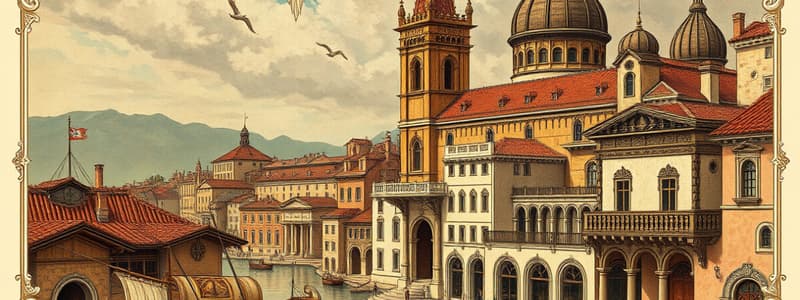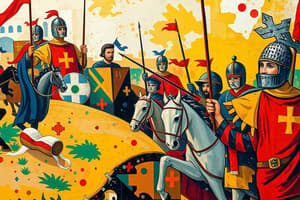Podcast
Questions and Answers
What was one major impact of the Crusades on the Italian port cities?
What was one major impact of the Crusades on the Italian port cities?
- Increase in cultural exchanges with Muslim traders (correct)
- Isolation from European trade routes
- Decline in olive oil trade
- Decrease in shipbuilding activities
In what way did the Crusades affect trade between Europeans and Muslims?
In what way did the Crusades affect trade between Europeans and Muslims?
- Reduction of trade routes
- Expansion of luxury goods trading (correct)
- Elimination of all trade barriers
- Introduction of new currencies
What was a notable effect of the Crusades on the relationships between European and Muslim leaders?
What was a notable effect of the Crusades on the relationships between European and Muslim leaders?
- Reduction in intercultural conflicts
- Enhanced trade agreements in some regions (correct)
- Stagnation of diplomatic efforts
- Formation of permanent alliances
What were the components of the motivations for the Crusades besides religious reasons?
What were the components of the motivations for the Crusades besides religious reasons?
Which of the following was NOT an economic reason for the Crusades?
Which of the following was NOT an economic reason for the Crusades?
Flashcards are hidden until you start studying
Study Notes
Impact on Italian Port Cities
- Italian port cities like Venice, Genoa, and Pisa emerged as vibrant trade hubs due to increased demand for transport and supplies during the Crusades.
- Control over key maritime routes allowed these cities to enjoy significant economic benefits and expand their influence in the Mediterranean.
- Establishment of trade networks with the Levant facilitated the exchange of goods such as silk, spices, and other luxury items.
Effect on Trade between Europeans and Muslims
- The Crusades created new commercial relationships, showcasing mutual reliance between Europeans and Muslim traders.
- Italian merchants gained access to Eastern markets, which led to the importation of exotic products that were previously unknown in Europe.
- Increased competition and supply of goods contributed to the rise of a more complex economy in Europe, enhancing merchant class wealth.
Trade Relations between European and Muslim Leaders
- Crusades often involved negotiations and agreements between European monarchs and Muslim leaders, focusing on trade and military alliances.
- Joint ventures included sharing military resources and opening trade routes, promoting an exchange of valuable goods and information.
- These interactions contributed to a gradual easing of tensions and set the stage for more diplomatic relations in later centuries.
Reasons for the Crusades
- Religious motivations included the desire to reclaim Jerusalem and other sacred sites from Muslim control, spurred by the calls from the Pope.
- Economic factors played a critical role, as land hunger, trade opportunities, and wealth accumulation drove many nobles and merchants to support the Crusades.
- Political ambitions also influenced the campaigns, with leaders seeking to expand their territories and power in a fragmented Europe.
Studying That Suits You
Use AI to generate personalized quizzes and flashcards to suit your learning preferences.




